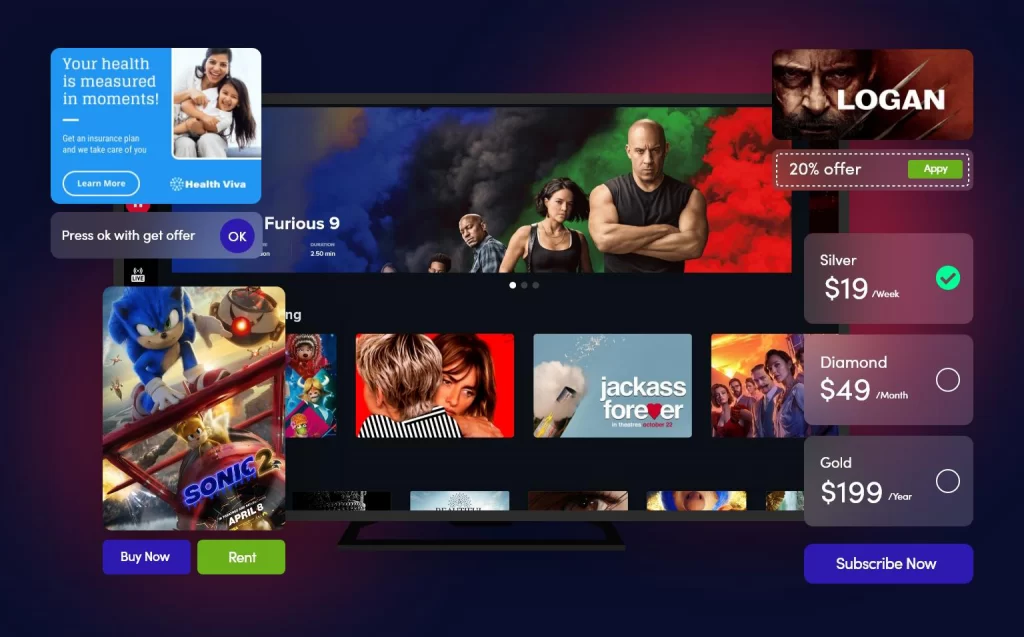9 Simple Techniques For Apollo Group Tv
Table of ContentsApollo Group Tv Things To Know Before You Get ThisHow Apollo Group Tv can Save You Time, Stress, and Money.Apollo Group Tv Things To Know Before You BuyThe smart Trick of Apollo Group Tv That Nobody is Discussing
In this circumstance, instead of having three-minute industrial spots throughout a 30-minute television program, television shows might alter to one where a consumer will certainly be required to have a month-to-month registration, to make sure that they cen sight targeted banner ads. This sort of marketing currently happens on the net, and the amount of data tv firms accumulate permits them to do similar.Clarify the impact of enrollers on program content. Describe the major fads among the broadcasting and cable networks. When television remained in its early stage, producers modeled the brand-new medium on radio. Popular radio shows such as authorities drama Dragnet and western cowboy series Gunsmoke were adapted for tv, and brand-new TV shows were funded by solitary advertisers, just as radio programs had been.
Today, the tv industry is much more complicated. Programs are sponsored by numerous marketers; programs is managed by major media corporations; and the three significant networks no much longer dominate the airwaves but rather share their viewers with many cable television networks. A number of aspects make up these fads within the market, consisting of technical growths, government laws, and the production of brand-new networks.

Some Known Questions About Apollo Group Tv.
Even public television has ended up being based on the influence of marketing. Established in 1969, (PBS) developed out of a report by the Carnegie Compensation on Educational Television, which examined the duty of instructional, noncommercial television on culture. The record recommended that the government money public television in order to provide variety of programming throughout the network eraa service developed "not to sell products" but to "improve citizenship and public service (McCauley, 2003)." Public tv was additionally planned to supply universal access to television for audiences in backwoods or viewers who could not pay for to pay for private tv services.
The period in between 1950 and 1970 is historically recognized as the. Apart from a small portion of airtime regulated by public tv, the three major networks (referred to as the Big 3) dominated the tv industry, collectively representing even more than 95 percent of prime-time viewing. In 1986, Rupert Murdoch, the head of international company Information Corp, introduced the Fox network, challenging the dominance of the Big Three.
Targeting young and minority audiences with programs such as Buffy the Vampire Slayer, Moesha, Dawson's Creek, and The Wayans Bros., the new networks intended to draw stations far from their old network associations. However, as opposed to duplicating the success of Fox, UPN and WB battled to make an effect. Unable to draw in many associate terminals, both recently established networks got to less homes than their larger rivals since they were inaccessible in some smaller sized cities.
This choice paved the method for the development of wire movie networks, adding to the exponential development of cable in the 1980s and 1990s. apollo group tv. More deregulation of cord in the 1984 Cable Communications Plan Act eliminated constraints on cable television rates, making it possible for operators to bill what they desired for wire services as long as there worked competition to the service (a criterion that over 90 percent of all wire markets can fulfill)
All about Apollo Group Tv

Having actually created the first "superstation," Turner broadened his realm by founding 24-hour information network CNN in 1980. At the end of the year, 28 nationwide programs services were offered, and the wire revolution had actually started. Over the following years, the industry went through a period of quick development and appeal, and by 1994 viewers could pick from 94 basic and 20 premium cable solutions.
Number 9 - https://www.ted.com/profiles/47980786/about.16 Increased competition from cable television networks has triggered a steady decline in the networks' audience scores. During the 1950s, the expense of generating a single tv program enhanced as programs became much longer and production expenses skyrocketed. Sponsorship on network tv shifted from solitary sponsorship, in which a program was entirely sustained and created by one marketer, to multiple sponsorship, in which advertisers bought 1- or 2-minute spots on the show
Pick one of the Big 4 networks and publish out its once a week programs schedule. View the network's prime-time programs over the program of a week, see page keeping in mind the target group for each show.
The Definitive Guide to Apollo Group Tv

Linear television, commonly described as typical broadcast TV, encompasses cord and satellite television. It's called "straight" due to the fact that content follows a fixed programs timetable, unlike on-demand material which the individual customer decides to see based upon their very own choices and routine. When you ask, "What is direct TV?", believe of it as the classic method of watching TV that has actually been around for years.